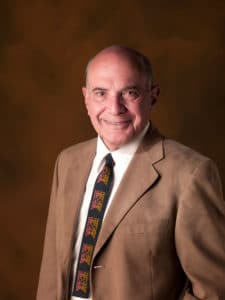You read the poems of The Next Time We Saw Paris by Samuel Hazo, and you think that this poet has mastered the art of wisdom poetry. Or perhaps he’s just wise, and when he writes a poem, he can’t help but write wisdom poetry.
His words are simple and direct. Hazo wastes no time getting to the point. The poem quickly explains what it’s about, and then it provides the detail or example or explanation. I understand this style much better than I used to; I think it comes with age. You reach an age when you’re not going to waste time with flowery or profound introductions, filled with metaphor and allusion. Instead, you get right to the point, and then you tell the story behind it. You might not have the time to do anything else.
A favorite poem among many favorite poems in this collection is “A Love Like No Other,” which tells you right up front what the point or moral or idea is, before it provides the example or evidence supporting it. In this case, it’s a short story whose ending sacks you upside the head.
A Love Like No Other
It happens rarely, if at all.
Age means little.
History
means less.
All that matters
is the mystery.
From infancy
to manhood our son’s love
for his godmother never lessened.
Sixty years between them
made no difference.
For hours
they could sit in the same room,
say little or nothing and be
perfectly happy.
Once
she even let him cut
her hair …
A decade later
she told my wife during
their last moments together,
“A very nice young man
always comes to see me,
and he looks just like your son.”
This poem is not an exception in the collection; it’s the rule. In each poem, Hazo speaks simply, directly, clearly, and forcefully. Time’s too short and growing shorter, so let’s not waste it to meander our way to what it’s all about. Make your point, provide the background, and move on.
Every poem is a gem.

Samuel Hazo
Hazo is the author of numerous works of poetry, drama, fiction, criticism, memoir, and translations. He received a B.A. degree from the University of Notre Dame, an M.A. degree from Duquesne University, and a Ph.D. degree from the University of Pittsburgh. He taught for 43 years at Duquesne, where he still serves as professor emeritus of English. Hazo is the founder and director of the International Poetry Forum in Pittsburgh, which hosted readings by more than 800 poets during its existence from 1966 to 2009. His writings have received numerous awards and honors, and he’s received 12 honorary doctorates. From 1993 to 2003, he served as the State of Pennsylvania’s first poet laureate.
In The Next Time We Saw Paris, the varied subjects are treated exactly the same. It may be love, memory, country, the sea, darkness, art, dancers, literature, family, and many others. Understanding is displayed by simple statements of wisdom, accompanied by simple statements of evidence. Hazo has provided a gift here, an enriching and profound gift.
Photo by Steven Penton, Creative Commons, via Flickr. Post by Glynn Young.
__________________________

“I require all our incoming poetry students—in the MFA I direct—to buy and read this book.”
—Jeanetta Calhoun Mish
- “Horace: Poet on a Volcano” by Peter Stothard - September 16, 2025
- Poets and Poems: The Three Collections of Pasquale Trozzolo - September 11, 2025
- Poets and Poems: Boris Dralyuk and “My Hollywood” - September 9, 2025

Laura Lynn Brown says
What a lovely, poignant snapshot of a relationship. One of the things poetry does best.
Elise Ryan, a lecturer in Pitt’s English literature department, recently conducted a great podcast interview with Samuel Hazo. https://beatriceinstitute.org/podcast/of-poetry-and-pittsburgh-a-conversation-with-samuel-hazo
Glynn says
Laura Lynn – thanks for sharing the link!
Maureen says
This also poignantly addresses the subject of aging, of what we hold in our minds till death. It gives expression to a scene from life that plays out again and again as we recall what matters most: the power of and to love.
Lovely selection!
Glynn says
Aging – yes, Maureen, that is probably why I identified with the poem so much! Thanks for the comment.
Megan Willome says
I think a poem like this one is so good at getting to the heart of a thing. We’re thrust into this relationship, this scene which we think we understand and then understand in a new way. It’s both more direct and yet more nuanced than an essay about the same thing.
Thanks for introducing us to Samuel Hazo, Glynn.
Glynn says
I’m rather embarrassed that this is the first collection of his that I’ve read. A friend recommended, and I’m glad I listened. Thanks, Megan, for the comment.